|
|
|
Sort Order |
|
|
|
Items / Page
|
|
|
|
|
|
|
| Srl | Item |
| 1 |
ID:
095311
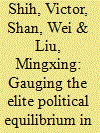

|
|
|
|
|
| Publication |
2010.
|
| Summary/Abstract |
Can one man dominate the Chinese Communist Party? This has been a much debated issue in the field of Chinese politics. Using a novel database that tracks the biographies of all Central Committee (CC) members from 1921 to 2007, we derive a measure of top CCP leaders' factional strength in the CC. We show that Mao could not maintain a commanding presence in the Party elite after the Eighth Party Congress in 1956, although the Party chairman enjoyed a prolonged period of consolidated support in the CC at a time when the CCP faced grave external threats. No Chinese leader, not even Mao himself, could regain the level of influence that he had enjoyed in the late 1940s. Our results, however, do not suggest that a "code of civility" has developed among Chinese leaders. The Cultural Revolution saw the destruction of Liu Shaoqi's faction. Although violent purges ended after the Cultural Revolution, Chinese leaders continued to promote followers into the CC and to remove rivals' followers
|
|
|
|
|
|
|
|
|
|
|
|
|
|
|
|
| 2 |
ID:
113547
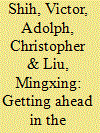

|
|
|
|
|
| Publication |
2012.
|
| Summary/Abstract |
Spectacular economic growth in China suggests the ruling Chinese Communist Party (CCP) has somehow gotten it right. A key hypothesis in both economics and political science is that the CCP's cadre evaluation system, combined with China's geography-based governing logic, has motivated local administrators to compete with one another to generate high growth. We raise a number of theoretical and empirical challenges to this claim. Using a new biographical database of Central Committee members, a previously overlooked feature of CCP reporting, and a novel Bayesian method that can estimate individual-level correlates of partially observed ranks, we find no evidence that strong growth performance was rewarded with higher party ranks at any of the postreform party congresses. Instead, factional ties with various top leaders, educational qualifications, and provincial revenue collection played substantial roles in elite ranking, suggesting that promotion systems served the immediate needs of the regime and its leaders, rather than encompassing goals such as economic growth.
|
|
|
|
|
|
|
|
|
|
|
|
|
|
|
|
| 3 |
ID:
105834
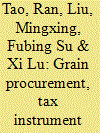

|
|
|
|
|
| Publication |
2011.
|
| Summary/Abstract |
In this paper, we argue that China's grain procurement system as a major instrument in rural taxation survived the communes and lost its importance only gradually in recent years. However, as agricultural liberalization progressed, the traditional tax instruments of 'tax deduction prior to grain procurement payment' and implicit taxation through 'price scissors' gradually eroded. Under such a circumstance, local governments in agriculture-based regions resorted to informal fees collected directly from individual rural households while the more industrialized regions shifted to non-agricultural taxes that are less costly in terms of tax collection. Empirical evidence based on a large panel data set supports our hypotheses of rural taxation in China.
|
|
|
|
|
|
|
|
|
|
|
|
|
|
|
|
| 4 |
ID:
124767
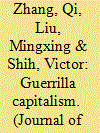

|
|
|
|
|
| Publication |
2013.
|
| Summary/Abstract |
In this article, we propose a causal relationship between a region's communist revolutionary legacy before 1949 and the variation in private sector development after 1949. In the case of Zhejiang, the pre-1949 revolutionary experience led to the power struggle between two elite groups, the guerrilla cadre group and the southbound cadre group, in the province after 1949. As the weak side, guerrilla cadres were willing to protect local economic interests in exchange for local popular support, which improved their odds of political survival. As a result, in contrast with counties where the guerrilla forces were historically weak, counties with strong guerrilla forces before 1949 saw significantly more robust private sector development throughout much of the Mao and post-Mao periods. In this article we provide preliminary historical and statistical evidence to support this hypothesis.
|
|
|
|
|
|
|
|
|
|
|
|
|
|
|
|
| 5 |
ID:
123695
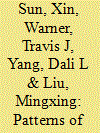

|
|
|
|
|
| Publication |
2013.
|
| Summary/Abstract |
A 'dual-power structure' governs the Chinese countryside. Branch committees of the Chinese Communist Party, traditionally the centers of power in the villages, increasingly share their authority with elected villagers' committees. Seeking to illuminate the factors contributing to the division of authority between these 'two committees', we view Party branch secretaries and the chairs of villagers' committees as the agents of two distinct principals. Party branch secretaries tend to derive their authority from township authorities, while villagers' committee chairs derive theirs from their village electorates. We predict that the division of authority between the two committees varies with (a) the relative levels of activism exhibited by the principals; and (b) the perceived legitimacy of the agents, as determined by their method of s/election. Through analysis of a unique dataset, we test four hypotheses derived from this framework. Our findings contribute to a better understanding of the 'exercise of power' in rural China and shed light on the dynamics of China's political evolution.
|
|
|
|
|
|
|
|
|
|
|
|
|
|
|
|
| 6 |
ID:
068988
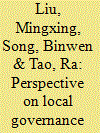

|
|
|
| 7 |
ID:
114854
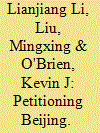

|
|
|
|
|
| Publication |
2012.
|
| Summary/Abstract |
What precipitated the 2003-06 "high tide" of petitioning Beijing and why did the tide wane? Interviews and archival sources suggest that a marked increase in petitioners coming to the capital was at least in part a response to encouraging signals that emerged when Hu Jintao and Wen Jiabao adopted a more populist leadership style. Because the presence of tens of thousands of petitioners helped expose policy failures of the previous leadership team, the Hu-Wen leadership appeared reasonably accommodating when petitioners arrived en masse in Beijing. Soon, however, the authorities shifted towards control and suppression, partly because frustrated petitioners employed disruptive tactics to draw attention from the Centre. In response to pressure from above, local authorities, especially county leaders, turned to coercion to contain assertive petitioners and used bribery to coax officials in the State Bureau of Letters and Visits to delete petition registrations. The high tide receded in late 2006 and was largely over by 2008. This article suggests that a high tide is more likely after a central leadership change, especially if a populist programme strikes a chord with the population and elite turnover augments confidence in the Centre and heightens expectations that it will be responsive to popular demands.
|
|
|
|
|
|
|
|
|
|
|
|
|
|
|
|
| 8 |
ID:
076904
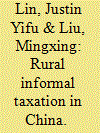

|
|
|
|
|
| Publication |
2007.
|
| Summary/Abstract |
The present paper examines the historical evolution of China's rural taxation system from the pre-reform period to the late 1990s. We propose that because of information asymmetry between the upper-level and the lower-level governments, local governments had to be granted some informal tax autonomy to fulfill the upper-level policy mandates. This easily led to excessive local informal taxation on farmers. As market liberalization of the grain sector progressed, the low-cost tax instruments implemented through the traditional approach of implicit taxation gradually eroded. Local governments in agricultural regions had to resort to informal fees collected directly from individual rural households while the more industrialized regions shifted to non-agricultural taxes that are less costly in terms of tax collection. Hence, political tension between farmers and local governments in agriculture-based regions emerged and rural tax reform became necessary.
|
|
|
|
|
|
|
|
|
|
|
|
|
|
|
|
| 9 |
ID:
110259


|
|
|
|
|
| Publication |
2012.
|
| Summary/Abstract |
China's fiscal arrangement in the 1980s has preserved local governments' incentive but the 1994 fiscal reform recentralized revenues. Since then, farmers' tax burdens have risen steeply and become a major challenge to the state legitimacy. How to account for the huge regional variation? Why were some localities able to tax more heavily than others? Based on a national survey of village governance in China, we examine farmers' burdens empirically and identify political and social factors that explain the local governments' ability to tax farmers. This paper suggests that developments since the 1990s have shown that it overstates local discretionary power and does not pay enough attention to societal forces in understanding local public finance.
|
|
|
|
|
|
|
|
|
|
|
|
|
|
|
|
| 10 |
ID:
092871
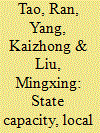

|
|
|
|
|
| Publication |
2009.
|
| Summary/Abstract |
Continued urban-rural income disparity poses a serious policy challenge in China's economic transition. As the Chinese economy booms and the state's fiscal capacity grows, there should be a corresponding increase in the center's capacity to redress urban-rural inequality. However, it seems that the stronger state extractive capacity since the mid-1990s has not translated into better urban-rural disparity outcomes. Based on a panel data set covering 270 prefectures in China between 1994 and 2003, the article evaluates the impact of local fiscal spending on urban-rural income disparity. Findings reveal a strong urban bias in China's local fiscal system under an increasingly centralized fiscal system. The centralized fiscal model has in fact reinforced this tendency and ironically weakened the capacity of the central state in achieving the policy goal of reducing the urban-rural divide.
|
|
|
|
|
|
|
|
|
|
|
|
|
|
|
|
|
|
|
|
|